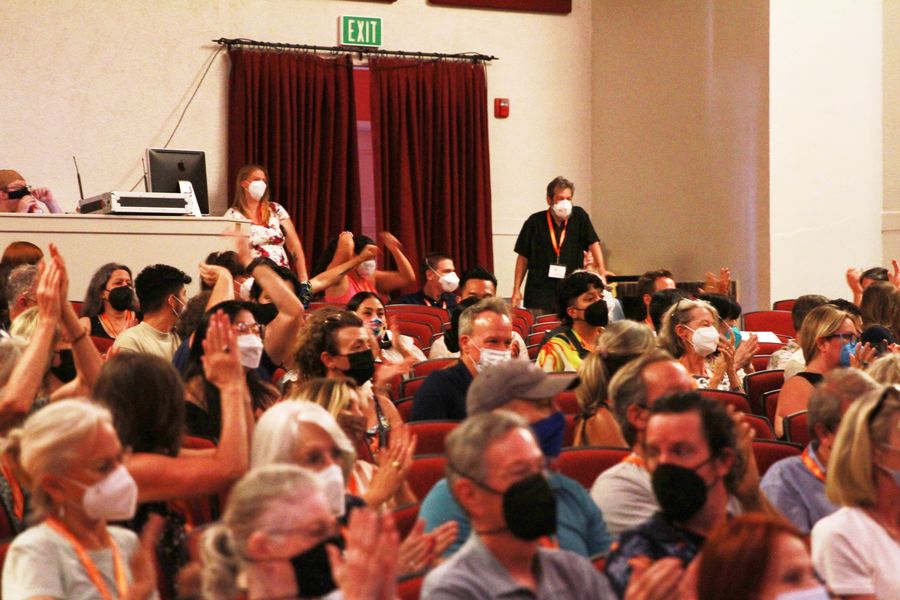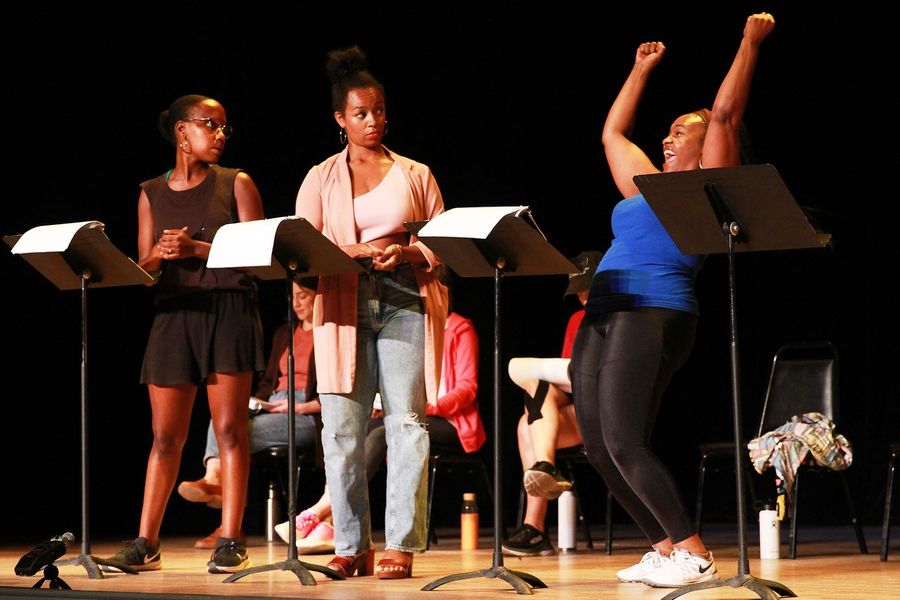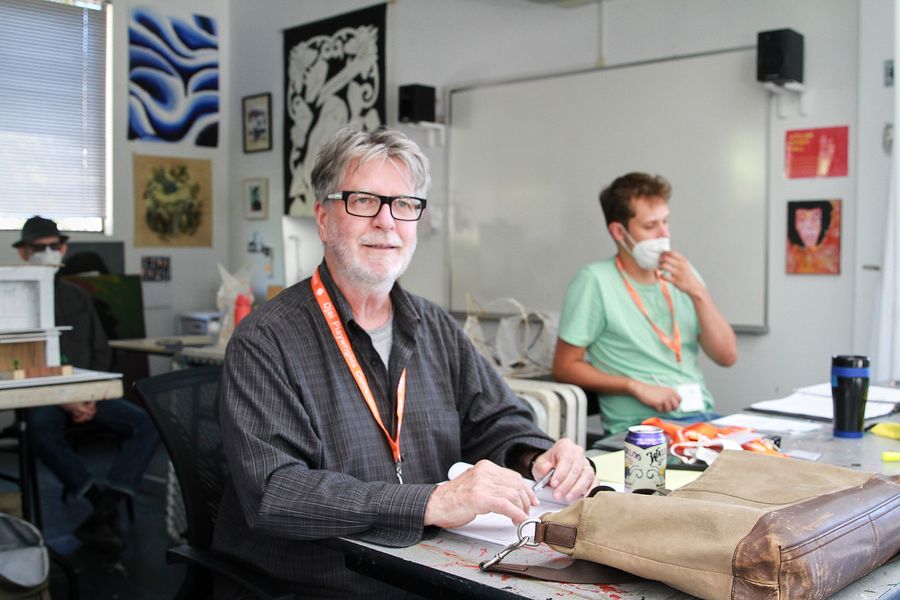On Sunday evening, Aug. 14, Robert Egan stood up at the front of an auditorium in Ojai, Calif., to introduce the final event of the 2022 Ojai Playwright’s Conference’s (OPC) New Works Festival, a staged reading of Bill Cain’s play-in-progress, God’s Spies. Promising to keep his remarks brief, because “it’s a two-act play,” Egan reminisced about the start of his long collaboration with Cain, who went on to be “the most produced playwright” at the Ojai conference. Their relationship began in the late 1980s, when Egan was the producing artistic director at the Mark Taper Forum in L.A. and Cain had a hit there with Stand-Up Tragedy.
Egan then alluded, a bit hesitantly, to another milestone: This would be his last introduction as OPC’s artistic director/producer, a role he’s held since 2002. He had announced his decision to step down in March.
“Look, my mantra is that change is good, transition is good,” Egan reassured the audience, made up of OPC board members and patrons, writers, directors, dramaturgs, stage managers, staff, and interns, assorted theatre enthusiasts—many of them noticeably long-faced even behind their KN95s.
Egan’s successor has yet to be announced, but he expressed confidence in his staff and supporters to sustain the organization he is credited with shaping and putting on the map. (OPC, which was founded in 1998, a few years before Egan came on board, celebrated 25 years this summer.) With a few last upbeat words, he waved a jaunty goodbye and made to bound out of the spotlight to let Cain’s play begin.
Not so fast: “Stay right where you are!” boomed a voice from the back. Down the aisle strode Cain, demonstrating surprising vocal power for so slender a man. “Did you think we were going to let you get away so easily?” Cain seated Egan in a chair and called the remaining artists and staff from their seats to gather down front for an impromptu homage.
“Every Ojai play has a single plot,” Cain said. “And that plot is: ‘Here, this thing that no one else has noticed—we have seen it as something beautiful and important. We will take this thing that has been lost, and we will show it to the world.’ You have found these plays, Bob. And you have found us.” The crowd hollered as Egan engulfed a tearful Cain in a hug.
A week earlier I had interviewed Egan over Zoom from L.A., before hitting the road for my first OPC experience. I asked him about his legacy and the impact of the plays he’s overseen over the past quarter century. With a chuckle, he said that a lot of people (“People I respect! Important people!”) have been asking about his legacy and the impact of the plays he’s overseen over the past quarter century. “They’re going, ‘What a legacy! Boy, you’ve had a big…’” He trailed off. “Maybe I should be thinking about it, but you don’t think about it while you’re doing it,” he insisted. “You just do the work.”

But of course the end of an era is time for stock-taking, and Egan’s tenure at Ojai has indeed shepherded an impressive catalog of influential and award-winning works through its workshops, including Fun Home by Lisa Kron and Jeanine Tesori, Jon Robin Baitz’s Other Desert Cities, Danai Gurira’s Eclipsed, and Stephen Adly Guirgis’s The Motherfucker with the Hat, to name a handful. As these works reflect Egan’s preferences for politically and socially engaged theatre, it’s hard not to conclude that his tastes have permeated our new-play culture to a profound degree.
Indeed, Egan is a man with a mission: He believes in playwriting as a force for social change. His statement on the OPC website lays out high, not to say daunting, standards for applicants: “We seek playwrights who question and rigorously explore our social moment. Plays and playwrights that make us think, reconsider and ultimately propel us beyond the polarizing limitations of racial discrimination, economic disparity, religious intolerance, political myth-making, sexual bigotry.”
As he told me over Zoom, “I’ve never been interested in bourgeois boulevard theatre, what I call plays of homology, about sameness and celebrating the sameness. Plays that are either critical realist plays, critiquing social reality as we see it, and those that are in severe disjunction with it—those are the plays that interest me.”
His experience in Seattle and then at L.A.’s Center Theater Group, where he was hired by the legendary Gordon Davidson to oversee new play development from 1983 to 2003, taught him how to support artists, particularly the ones making the kind of work he likes, so that by the time he got to Ojai, he said, “I kind of knew what I wanted it to be.” And what it would not be: “The big thing was, we’re not a producing organization. We’re pure, doing everything we can to support and collaborate with these playwrights in helping fulfill their vision of their play.” With his background in play analysis and practical theatre producing, he said, “I knew it had to be joyous, and I knew it had to be communal, because the playwrights particularly work so much alone. So we live together and eat together for two weeks. Playwrights love it. Everybody talks about it as the Shangri-La of new-play development.”
I agreed that it sounded fun, like a summer camp for writers. Right?
“Summer camp is exactly what it’s not,” Egan quickly retorted. “It’s rigorous. Once you sit in the room in the first week, and you hear the plays read among the artists—the actors are not here yet—the bar is set very high. And they are like, ‘Oh, shit.’ We take it seriously. These people are saving various worlds. They want to see change. They want people to wake up. They want to have impact. They work hard. And it all comes from the artists.”
Just that morning, he’d overheard Guirgis, on his third tour of Ojai, telling a collaborator, “You don’t have to blow smoke with me. You can tell me anything about my play.”
I told Egan that I had a Zoom interview set up with Guirgis in half an hour. Egan grinned. “Tell him I said hi. And that I love him.”
But our appointment had slipped Guirgis’s mind, and by the time he was tracked down and forced onto Zoom, he appeared so flustered and cross that I worried we’d never move past the mishap. I passed along Egan’s message, hoping to cheer him up, but it only seemed to make him feel guiltier. So I moved on to what had inspired him to write his new play, a stage adaptation of Sidney Lumet’s 1975 film Dog Day Afternoon.
“Warner Bros. asked me to do it six years ago,” Guirgis said. “And I’ve just been going from crisis to crisis on top of my usual lateness. They don’t seem to want to fire me, so I feel like I want to get it done. I know it’s Bob’s last year, and he kind of changed around the whole schedule so I could come. He’s like, ‘I’m gonna direct your piece.’ So I figured that would add more guilt that would hopefully inspire me.”
For Guirgis, who is disarmingly frank about his struggles with writer’s block, guilt is almost a requirement for getting anything done. “If I was just home by myself, I could invent like a million reasons not to work,” he said. “You travel 3,500 miles with an old dog, and it creates an expectation to just see the work. I came up here with half a play. I want to try to get that bad first draft down and up, and get to hear that bad first draft.” Guirgis is clear about the conference’s driving force: “Bob is amazing. He really does have the enthusiasm of an intern but the know-how of a lifetime. Which makes it really an unpalatable notion to get up there Thursday and have the same shit that I had last week.”
After our conversation, I hit the road for Ojai, driving north along the coast for about 90 minutes before turning east and making my way inland past dry tawny hills and into the lush Ojai valley. The area’s unspoiled charms and artsy, sleepy main street make it popular with tourists, celebrities, and retirees. The Playwrights Conference is held in an even more remote location, several miles out of town, on the hilly campus of a private boarding school called the Besant School of the Happy Valley. It’s the sort of gorgeous, unspoiled setting that would make a perfect backdrop for a horror movie: uneven uphill paths, patches of silty gravel. Definitely not a place to wear heels.
I was going to attend the opening public event in the New Works Festival; Egan calls these “intersections.” I knew that the playwrights were still revising their scripts and about to go into rehearsal with their directors, dramaturgs, and actors for the public readings set for later in the week. But they’d agreed to a few hours’ break for a panel discussion, moderated by Egan, about what they were working on. I hiked up a steep path to the auditorium where I joined a small crowd of well-dressed local theatre enthusiasts, many of them long-time OPC supporters.
The weather was incredibly hot, even at 7 p.m.—though when I commented on it, someone objected, “This is cool!” To me the sky felt like a damp wool blanket. I was also a little worried that the discourse would be abstruse and jargon-y and over my head. I needn’t have worried. Watching Egan in his natural habitat made it clear how he has won such deep loyalty and affection from patrons and artists. He wore his role as master of ceremonies lightly, playfully, always keeping the focus on the writers, for whom he exuded an almost paternal affection and delight. They in turn basked in his regard.
Zakiya Young started the evening off with a Cinderella story on par with the legend of Lana Turner getting discovered at Schwab’s drugstore. Young first came to OPC in 2018 as an actor. Then Egan saw one of her Facebook posts and reached out to ask her if she’d ever considered writing. Now she’s working on a one-woman show, Suburban Black Girl. “Thank you, Bob, for changing my life!” she said, holding back tears.

Next we met Michael Shayan, a queer Iranian American writer who had been a child performer—at the age of 13—at Hollywood’s Magic Castle. He worked some magic tricks into the scathingly funny excerpt he read from a new show. We got tantalizing teasers of plays in progress from Anna Ziegler, Peter Kim George, Jahna Ferron-Smith, and this summer’s writers-in-residence, Zora Howard and Lyndsey Bourne. Finally, Guirgis reduced the crowd to helpless hysterics with a reading of a long-overdue preface he had finally written in order to avoid writing his script.
I left the event eager to return for as many of the readings as my schedule would allow. OPC has a policy against reviews—it’s one of the protections it promises its writers. But I was there on Thursday night for Dog Day Afternoon (Guirgis had finished his draft just an hour before the curtain, and despite his self-deprecating stage directions, which Egan read out loud, it slayed). On Sunday I took in a full day of readings: Peter Kim George’s To Red Tendons, a brainy metatheatrical examination of racial tensions during the 1992 L.A. riots; a darkly witty sex comedy, Running While Black, by Jahna Ferron-Smith; and finally Cain’s God’s Spies, an imaginary account of how Shakespeare wrote King Lear while quarantining with two strangers during a pandemic. The actors—many of whom I recognized from L.A. theatre—brought the words to compelling life even without sets or costumes. And while the scripts reflected widely different concerns, experiences, and worldviews, there was something like a family resemblance in their bold, fearless approach to potentially controversial material: All seem destined to start conversations.
Egan, meanwhile, appeared to be having the time of his life, visible everywhere all at once, and laughing the loudest at the funniest lines in every reading. Near the end of our interview, I’d asked him if there was anything he’d miss about the OPC. He looked surprised, replying with a shrug that he wouldn’t need to miss it—he could always come visit, after all. “It’s on me to keep up my connections here,” he said.
But when I ran into him later, he mentioned that he’d thought of another answer for me, and he sent me this email:
I will miss walking across our OPC campus and listening to the loving, daring, and passionate work being done in the rooms as the actors, directors, and dramaturgs serve the evolving vision of the playwright. I will miss the joy and the exhilaration of the breakthroughs with the writers and the actors bringing new writing into sudden and sharp light. Patrick Adams literally shuddering with the final thoughts of an anguished vet as he comes to terms with his war crimes in Bill Cain’s Nine Circles. Laila Robins’s anguished reckoning with the death of her son in Sam Hunter’s haunting Greater Clements. The brave and poignant revelations of culture, otherness, and oneness in the personal sagas of Trieu Tran and Richard Cabral. The unbridled laughter and joy of recognition of our need to unite and create a world that can roar with the absurdity of our present limitations and the hope of our future possibilities in Kimber Lee, Stephen Adly Guirgis, Danai Gurira, Liza Powell O’Brien, and Robbie Baitz…I will certainly miss these extraordinary bursts of creativity and wonder.
Egan will miss them from a farm he and his wife, Michelle Joyner, own in the Berkshires, in Western Massachusetts, where they plan to run an artists’ colony. They’re going to keep it small, so “I won’t have to serve as many voices administratively.” Egan was involved in every aspect of OPC, from fundraising to moving chairs around between scenes, and while he told me, “There’s a time in your life when that’s all fun. Now I’d rather hang out with my dog, Betty Sue.”
But however cheerfully Egan insists that he’s ready to leave Ojai, that “21 years is enough” and that “change is good,” having experienced just a taste of his happy symbiosis with the organization, I’m having trouble imagining anybody else at the helm. But that’s the way life works, Egan assured me: He experienced some “growing pains” back when he took over; growing pains are a part of, well, growing. He isn’t worried. He has faith in the mission.
Guirgis had a similarly Zen take on the changing of the guard. “I’ve worked with the associate artistic directors here,” he said. “I think the people that are involved in this are super-invested in its continuation, and I doubt they would bring anybody in who they didn’t feel was gonna continue the mission. A new artistic director comes, and some things are different, right?” Guirgis, who witnessed the Public Theater’s transition from George C. Wolfe to Oskar Eustis, has faith that “the guiding principles that make this a great experience, I’m sure they will be honored, maintained, cultivated. You know?”
Margaret Gray (she/her) is a freelance writer and theatre critic based in Los Angeles. She has written for The Los Angeles Times, SDC Journal, and The Washington Post.


